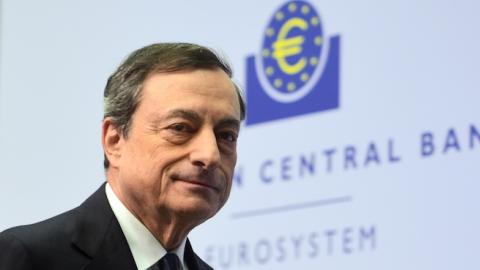“The option of doing nothing would go against price stability.” In making those comments to a European Parliament Committee on November 12, European Central Bank Chief Mario Draghi indicated that the ECB is on course to expand its “monetary experiment” next month. Expansion is to take the form of increased government bond purchases (across all members) over an extended period and cutting the interest rate paid by the ECB on reserves even further below zero. The unspoken purpose, camouflaged in anti-deflation rhetoric, is to devalue the euro.
The German Government’s Council of Economic Advisers, the so-called “Five Wise Men,” writes in its just published report that the ECB’s experiment should already be wound down not least due to the amount of financial instability which it is creating. No one seriously expects Chancellor Merkel to pass this message on to the ECB Chief, whether directly or indirectly via the Bundesbank President, who holds the same opinion. Throughout her chancellorship Angela Merkel has always ultimately sided with the ECB President (first Trichet and now Draghi) and against the Bundesbank on any matter of principle regarding sovereign and bank bail-outs or more generally money printing. “Safeguarding the euro” and helping the big German exporters is the combined reflex of this former lieutenant to Chancellor Kohl in the later stages of his drive to take Germany into European Monetary Union.
Even so, there has been some speculation in the financial markets that this time could be a little different. Chancellor Merkel’s popularity with German voters has fallen as a consequence of how she has handled the crisis of mass immigrant inflows from the Middle East. Elements within her Christian Democratic Union (CDU), including the Finance Minister, already frustrated with her spring bail-out for Greece have sought (unsuccessfully so far) to toughen the rules regarding benefits for the new arrivals. Merkel’s Bavarian conservative Social Party coalition partner has been more explicit in its criticisms. Politicians to her left have taken issue with her pre-election gift to Turkish President Recep Erdogan, indicating to him one week before the recent poll that visa-free travel to Europe could be on the table for his fellow-citizens. The final deal would depend on his cooperation in stemming the onward flow of Syrian and other migrants passing through Turkey and on to Germany.
In a series of state elections next year, the CDU is expected to rack up losses due to defections of traditional supporters to the far Right and widespread abstentions. Yet if the CDU were to dump Merkel ahead of the 2017 general elections no serious commentator suggests that its performance would improve overall. Yes, defections to the far Right might fall, but those to the Centre Left would rise. And no one should underestimate Merkel’s ability to make policy adjustments, especially in terms of presentation towards winning an election even if causing some temporary annoyance to her euro friends. But that will be the story of 2017, not now.
So Draghi can count himself free of serious restraint from Berlin. Also there is no sign of Washington preparing to enter the fray and warn Europe that an intensification of ECB experimentation at this point—just when the Federal Reserve is readying “lift off”—would be regarded as “currency manipulation.” That is a charge, it seems, reserved for China, even though at this point in time Beijing’s manipulations in total are most plausibly causing its currency to rest at a higher level than under the forces of a free market.



















